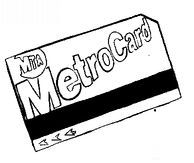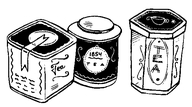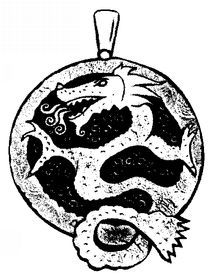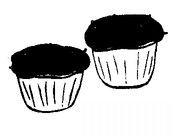Boiling Point (7 page)
Authors: Diane Muldrow

“Hurry!” cried Peichi. “We still have to buy our MetroCards!”

At the MetroCard machine, the girls giggled nervously as they quickly searched their pockets for money.
The train roared into the station just as Molly and Peichi got their cards. They cranked through the turnstiles and got on the train. The doors closed behind them, and they were on their way.
“This was a great idea!” exclaimed Molly, trying to catch her breath.
Peichi was right. Less than half an hour later, the train got to Canal Street.
“This is it!” cried Peichi. The girls hurried off the train and up the stairs, into bright sunlight and bustling Chinatown.
“Okay,” said Peichi, looking around. “I know exactly where we are. All we have to do is go down Canal Street and find Mulberry Street. This way!” She led Molly through the congested street. “Have you ever been to Chinatown before?”
“Just once, for dinner, and that was at night. Look at all these store signs in Chinese! Can you read them?”
“Not really,” admitted Peichi. “But I’m learning.”
“Whoa,” said Molly, as the smell of fresh fish hit her. The girls had come to an open-air fish stand covered with an awning. It led to an indoor fish market. “
Oooh!
What are these big fish with the whiskers? They’re still alive!”
Oooh!
What are these big fish with the whiskers? They’re still alive!”
“Those are catfish,” said Peichi. “Yum! Look—live lobsters, too. I love lobster.”
Street vendors sold all kinds of stuff right on the sidewalks. Bamboo. Pocketbooks. Electronics. Socks. Dragon and Buddha sculptures. Vegetables, some of which Molly had never seen.
“You can buy anything in Chinatown,” observed Molly. “But it’s so crowded here! It’s hard to walk around.” She heard Chinese being spoken all around her, mixed in with accents and other foreign languages. It seemed to Molly like the whole world had come to Chinatown that day.
Peichi suddenly stopped walking. “
Hmmm
,” she murmured, looking up and around. “I don’t remember this bakery.”
Hmmm
,” she murmured, looking up and around. “I don’t remember this bakery.”
“What’s the matter?” asked Molly.
Peichi frowned. “Uh, we should have come to Mulberry by now.”
“You mean, we’re lost?” asked Molly. The sun was beating down on her face. She wished she had her sunglasses. Throngs of tourists and shoppers threatened to separate her from Peichi.
“Oh! I know,” said Peichi. “We went the wrong way down Canal. Let’s turn around.”
Whatever,
thought Molly.
Just as long as we’re not lost.
Someone bumped into her. Suddenly she felt like she was a million miles from home.
thought Molly.
Just as long as we’re not lost.
Someone bumped into her. Suddenly she felt like she was a million miles from home.
The girls turned back and finally came to Mulberry Street. They turned right, and came upon a store with a big awning. Rows and rows of cooked ducks hung displayed in the window.
“This is it!” cried Peichi. “It’s one of the biggest stores in Chinatown. You’ll see.”
The girls went inside. A long line of people waited patiently for a duck, crispy chicken, or barbecued spareribs. But that part of the store was small and almost separate from the rest of it.
Peichi spotted her grandfather filling a large jar with loose tea leaves. “Hi, Ah-yeh!” she called, going toward him.
Startled, the senior Mr. Cheng turned around.
“Peichi!” he cried in surprise. He hugged her and said some words to her in Chinese. Then he saw Molly. “Hello,” he said, nodding and smiling.
“Ah-yeh, this is my friend Molly,” said Peichi. “Molly, this is my grandfather.”
“Hello, Mr. Cheng.” said Molly, blushing. She always felt awkward around adults she didn’t know.
Peichi’s grandfather called out something in Chinese, and Peichi’s grandmother appeared from a back room.
“Peichi!”
“Surprise, Ah-mah!” cried Peichi, reaching out for a hug. Then she introduced Molly.
While Peichi was busy talking to her grandparents, Molly decided to explore. She was staring at a display of shredded squid when Peichi caught up to her. “Come on, I’ll show you around,” she said to Molly.
The girls wandered up and down the aisles. Molly hardly recognized any of the food for sale.
“This is one of my favorite snacks,” Peichi said, holding up a foil package. “Roasted hot green peas. And here are shrimp chips!”

They came to the tea section, where lots of people were reaching for pretty tins of all kinds of teas. There were big jars of tea leaves. And there were porcelain tea sets and rice bowls.
And then there was the sweets aisle.
Molly picked up a clear package of round, striped cookies. “Umbrella cookies,” she read. Not every package was printed in Chinese.
Peichi picked up a package of candies that were wrapped in red foil. “These candies are so good! They’re strawberry flavored. We always eat them during Chinese New Year.” Suddenly the package slipped from Peichi’s hand and fell to the floor. “Whoops,” she said, and kneeled down to pick it up.
Peichi didn’t get up right away.
“What are you doing?” asked Molly. “We really need to get going.” She was getting nervous about the time.
“There’s something under this shelf,” said Peichi.
“Oof.”
She grunted as she reached her arm as far as it would go. “Here it is.”
“Oof.”
She grunted as she reached her arm as far as it would go. “Here it is.”
Peichi had found a small pouch. “There’s something in it!” she said in a loud whisper.
“What is it?” asked Molly. “Open it!”
“I’m trying to,” said Peichi. “It’s hard to open.” Inside the pouch was a package that was taped shut.
“Ohmygosh!”
exclaimed the girls as Peichi finally unwrapped a large grayish, yellow-green gemstone. It was a disc-shaped pendant, highly polished with a beautiful carving of a dragon and elaborate designs.
exclaimed the girls as Peichi finally unwrapped a large grayish, yellow-green gemstone. It was a disc-shaped pendant, highly polished with a beautiful carving of a dragon and elaborate designs.
“This is jade!” said Peichi.
“Jade?” asked Molly. “I’ve never seen this stone before.”

“Jade is used a lot in China,” said Peichi. “And guess what? ‘Peichi’ means ‘precious jade’. This couldn’t be real, though. It’s too big. But it’s so pretty! Cool!” She stuffed the pendant in the pocket of her denim skirt.
“Uh, Peichi, aren’t you going to show it to your grandma?” asked Molly, frowning.
“Sure,” replied Peichi breezily. “But see how busy she is? She and Ah-yeh are coming over next weekend. I’ll show her then. I just want to hold on to it for a couple of days.”
“But what if it’s
really
real?” Molly said. “What if someone lost it, and has been looking all over for it?”
really
real?” Molly said. “What if someone lost it, and has been looking all over for it?”
“I doubt it,” Peichi said. “About the real part. I mean, do you know how much this would be worth if it were real? A
lot
of money!”
lot
of money!”
“Well, it
could
be real,” Molly said.
could
be real,” Molly said.
Peichi took the stone out of her pocket and looked at it. What if Molly was right?
“I really think you should show it to your grandmother,” Molly repeated.
Peichi looked over at Ah-mah. She was still busy with customers. “Well. I don’t want to bother her now. She looks busy,” Peichi told Molly. “I promise I’ll show it to her next week. Besides, if it were really real, someone would have put up a lost sign, don’t you think?”
Molly shrugged. “I’m not sure. But I’ll tell you what I am sure of—we have to get going!” It seemed as if they’d been gone from home a long time.
“Okay.” said Peichi. They waved good-bye to her grandparents, and headed to the subway.
The girls were lucky again. The train was just heading into the station when they got downstairs.
“
Whew
,
”
said Molly. “No waiting, what a relief.”
Whew
,
”
said Molly. “No waiting, what a relief.”
But that’s when their luck ran out.
On the subway car, Peichi suddenly saw a familiar head of hair behind a newspaper, and her stomach churned.
Her dad was standing twofeet away from them!
He was coming home from work.
Her dad was standing twofeet away from them!
He was coming home from work.
Peichi motioned to Molly to walk the other way, but the car was so crowded that Molly couldn’t get through. Turning the page of his newspaper, Mr. Cheng suddenly saw the girls.
“Peichi! Molly!” he said, surprised. “What are you girls doing here?”
chapter 6
W
ile Molly and Peichi were having their Chinatown adventure, Amanda was practicing a difficult new piece of music. As her fingers fumbled over wrong notes, she wondered what her sister and Peichi were up to. Neither of them ever broke rules, so what was up with them now? Amanda banged her hands on the keys. Kitty let out a loud meow and scampered away.
Maybe I shoald have gone, too,
Amanda thought.
They’re probably having a blast!
ile Molly and Peichi were having their Chinatown adventure, Amanda was practicing a difficult new piece of music. As her fingers fumbled over wrong notes, she wondered what her sister and Peichi were up to. Neither of them ever broke rules, so what was up with them now? Amanda banged her hands on the keys. Kitty let out a loud meow and scampered away.
Maybe I shoald have gone, too,
Amanda thought.
They’re probably having a blast!
BRRRIIING!
Amanda jumped off the piano bench and ran to the phone.
Amanda jumped off the piano bench and ran to the phone.
“Hello?”
she said.
she said.
“Is this the Moore residence?” asked a high-pitched woman’s voice.
“Yes.”
“This is Ms. Brenda Barlow,” stated the caller. “With whom am I speaking?”
“I’m Amanda Moore.”
“I’m calling about the cooking service, dear. I got your name from Ella Jamison. She’s a
very
good friend of mine, and she just
raved
about what good little
cooks
you are!”
very
good friend of mine, and she just
raved
about what good little
cooks
you are!”
“Oh,” said Amanda. “Thats—that’s nice. Thank you. I mean, please tell her thank you.”
“I certainly
will,
my dear. And
I’d
like to hire you to do just one little dinner for me. It’s next weekend. It’s my little angel’s birthday, and I’m having her aunt and uncle over, and her grandmother. I’m actually a
terrific
cook, but I’m just
terribly
busy, and won’t be able to do it myself. I’d like something simple, just a roasted chicken, a nice salad,
that
sort of thing. Can you do that?”
will,
my dear. And
I’d
like to hire you to do just one little dinner for me. It’s next weekend. It’s my little angel’s birthday, and I’m having her aunt and uncle over, and her grandmother. I’m actually a
terrific
cook, but I’m just
terribly
busy, and won’t be able to do it myself. I’d like something simple, just a roasted chicken, a nice salad,
that
sort of thing. Can you do that?”
“Sure,” said Amanda. “We can definitely make that.”
“Naturally, dear, I’ll need some desserts, too.”
Amanda felt her face get hot. “Well, I don’t know if we could do a birthday cake. We haven’t made a layer cake before—”
“No need for a birthday cake, dear. No need at
all.
My little angel would rather have cupcakes anyway. You do make cupcakes, don’t you? Young girls still
love
to make cupcakes, don’t they?”
all.
My little angel would rather have cupcakes anyway. You do make cupcakes, don’t you? Young girls still
love
to make cupcakes, don’t they?”

Other books
Everything Is Bullshit: The Greatest Scams on Earth Revealed by Zachary Crockett
Spartacus by Lewis Grassic Gibbon
Kalahari Typing School for Men by Smith, Alexander Mccall
High Plains Massacre by Jon Sharpe
The Emoticon Generation by Guy Hasson
1 The Underhanded Stitch by Marjory Sorrell Rockwell
What a Wonderful World by Marcus Chown
All Yours by Translated By Miranda France By (author) Pineiro Claudia
The Secret Trinity Unearth by Jenna Bernel
